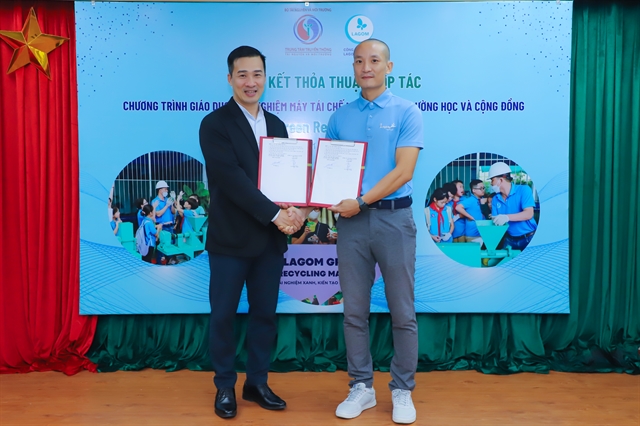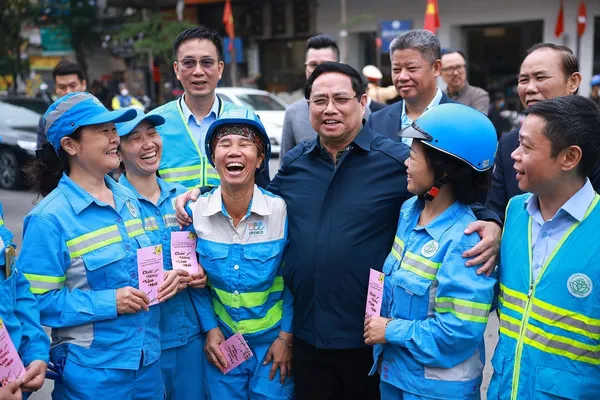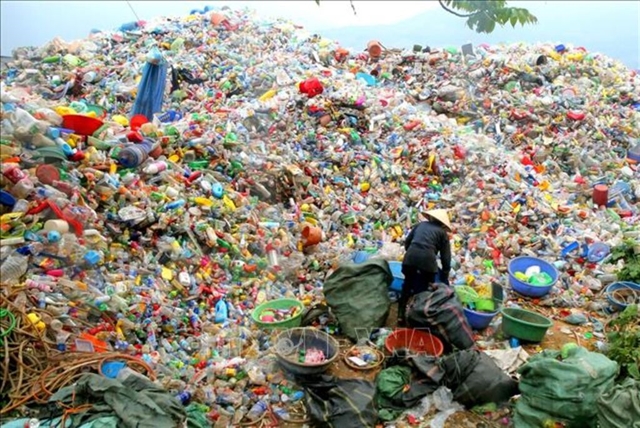 Economy
Economy

 |
| Phan Tuấn Hùng, Director of the Ministry of Natural Resources and Environment's Department of Legal Affairs Department. — Photo tainguyenmoitruong.gov.vn |
Việt Nam is adopting the circular economy model to optimise resource use and reduce waste.
From January 1, 2024, businesses producing or importing tyres, batteries, lubricants, oils and packaging were forced to fulfil Extended Producer Responsibility (EPR) under the Environmental Protection Law and Decree No. 08/2022/NĐ-CP.
However, in an interview with Vietnam News Agency after nearly a year of enforcement, Phan Tuấn Hùng, Director of the Department of Legal Affairs Department, under the Ministry of Natural Resources and Environment, said many businesses remain confused about the recycling regulations, leading to delays in implementation.
How is the enforcement of EPR regulations for businesses under Decree No. 08/2022/NĐ-CP being carried out?
Since January 1, 2024, many recycling businesses have been following the rules and carrying out their tasks properly under environmental laws and the legal framework for recycling.
During this time, we have received questions from some businesses, producers and importers who are unclear about the regulations. In particular, some businesses have asked for clarification on the recycling cost standard (Fs). This is one option for producers and importers to meet their recycling responsibilities for products and packaging.
Fs also serves as the basis for managing the recycling or disposal of products and packaging if the producer or importer chooses to pay a fee instead of organising recycling themselves. However, there is currently no regulation on how this payment should be made, which has led to confusion.
To resolve this issue, an amendment to Decree No. 08 is necessary. Recently, the Ministry of Natural Resources and Environment (MONRE) proposed to the Prime Minister that the decree be updated to keep the recycling responsibility timeline, but allow businesses to delay their implementation deadlines.
For example, if a producer or importer selects the payment option for recycling, but cannot meet the 2024 deadline due to policy challenges, they would be permitted to extend the deadline to 2025.
Additionally, some businesses have suggested combining both options – paying the fee while also recycling part of the same product and packaging (for example, recycling a portion of tyres and paying for the rest). However, the 2020 Environmental Protection Law clearly states that businesses must choose either "recycling" or "paying the fee" for each product being recycled. This regulation is reasonable as allowing both options could lead to confusion and management difficulties.
Businesses with multiple products and different types of packaging can choose to recycle or pay the fee for each product or packaging type. This flexible regulation under the law allows businesses to select the most effective way to comply. Such an option is not available in other countries.
 |
| A plastic waste collection site. — VNA/VNS Photo |
Some businesses have raised concerns about how to track when customers finish using products with recyclable packaging and dispose of the packaging for collection and recycling. Could you clarify this issue?
This issue is covered in Article 78 of Decree No. 08. Producers and importers must recycle their own products and packaging or similar ones made or imported by others, as listed in Annex XXII, to meet mandatory recycling rates.
They do not need to track when customers use and discard packaging Instead, they can purchase used products and packaging of the same type from the market to meet the required recycling rates and standards for their products, while deciding freely how to use the recycled materials.
For imported products, the regulations require importers to recycle their products regardless of whether the goods have been sold. They must ensure the products and packaging meet the mandatory recycling rates.
Are importers with total imported goods valued below VNĐ20 billion (US$787,000) exempt from recycling responsibilities? If they buy cosmetics from another importer whose imports exceed VNĐ20 billion, does the exemption still apply?
Businesses with imported goods valued below VNĐ20 billion are exempt from recycling responsibilities. However, if a business avoids responsibility by importing goods under VNĐ20 billion and purchasing additional items (e.g., cosmetics worth VNĐ10 billion) from another importer to sell, the original importer remains responsible for recycling.
If the business rebrands the purchased cosmetics under its own name, it becomes the producer and must handle recycling for the rebranded products.
What procedures must a business follow to apply for an exemption from the recycling responsibilities under Decree No. 08 and are there specific penalties for non-compliance?
Businesses that are required to fulfil the recycling or waste treatment responsibilities must complete the registration, declaration and reporting procedures as outlined in Decree No. 08. However, if a business is not subject to these obligations, they do not need to follow these procedures.
Penalties for non-compliance are detailed in Article 32 of Decree No. 45/2022/NĐ-CP, with fines of up to VNĐ1 billion for individuals and VNĐ2 billion for organisations. Violators may also face corrective measures depending on the violation. — VNS




